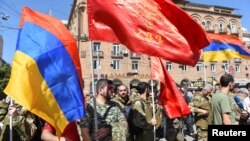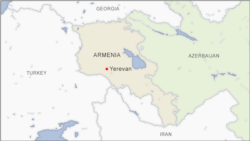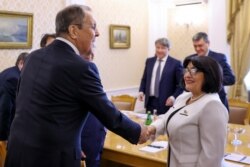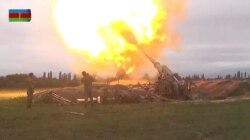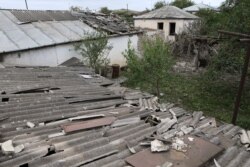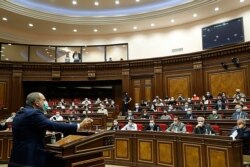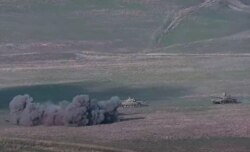Russia joined the U.S. and other nations urging restraint from Azerbaijan and Armenia as fierce weekend fighting between the two rival neighbors over the breakaway Nagorno-Karabakh region threatened to spiral into a wider conflict in the South Caucasus region.
“We call on all sides in the conflict to show maximum restraint, to reject military methods and refuse any steps that might provoke an undesired escalation of the situation that is de facto already a military conflict,” said Kremlin spokesman Dmitry Peskov in remarks to journalists in Moscow on Monday.
Peskov added that President Vladimir Putin had discussed the crisis with Armenian Prime Minister Nikol Pashinyan over the weekend but would do the same with the Azeri leader Ilham Aliyev “if necessary.”
Underscoring Russia’s delicate global balancing act, Foreign Minister Sergey Lavrov stressed the need for a cease-fire in phone calls with counterparts from Armenia, Azerbaijan, as well as Turkey — which backs Baku and has been Moscow’s on-again off-again partner amid its military campaign in Syria.
The U.S. Department of State also issued a press release saying the U.S. was “alarmed” by “large scale military action,” that had led to “significant casualties.”
“We extend our condolences to the families of those killed and injured,” said the statement by spokesman Morgan Ortagus.
“The United States condemns in the strongest terms this escalation of violence,” he said.
A conflict resurfaces
Azerbaijan and Armenia engaged in heavy artillery fire beginning Sunday with reports of dozens dead and hundreds injured — the latest in a long-simmering conflict that erupted out of the wreckage of the Soviet Union.
Much of that animosity has focused on Nagorno-Karabakh — an ethnically Armenian enclave inside Azerbaijan’s borders that was the site of a war in the early 1990s that killed 30,000 and displaced over one million people.
Further contributing to distrust are religious tensions. Armenia is majority Christian while Azerbaijan is primarily Muslim.
The U.S., Russia, and France are co-chairs of a working group that has sought to defuse the conflict under the auspices of the Organization for Security and Cooperation in Europe, OSCE.
A 1994 internationally negotiated cease-fire froze the conflict but has failed to bring a lasting peace. Nagorno-Karabakh has declared its independence and is recognized by Armenia, the internationally community formally recognizes the territory as part of Azerbaijan.
Over the years, both sides have engaged in skirmishes and breached the cease-fire — with dead and casualties to show for it.
Conflicting casualty reports
As of Monday, Armenia and Azerbaijan each made unverifiable claims of inflicting heavy damage on the opposing side as both countries mobilized for war.
Azerbaijan’s Ministry of Defense said it had killed over 500 Armenian soldiers and destroyed 26 armored vehicles, weapons stores, and unmanned drones.
Armenia’s Defense Ministry countered it had been the Azeris who lost 200 soldiers, 30 armored vehicles, and 30 drones — while saying that 200 of its soldiers had been wounded amid fighting.
Armenia's parliament also condemned what it called a "full-scale military attack" by Azerbaijan on Nagorno-Karabakh.
Meanwhile, the separatist government in Nagorno-Karabakh said 28 of its soldiers had died but key ground installations had been retaken by its forces.
It also claimed Azeri forces had launched a tank assault against the northeast portion of the enclave.
Further muddying the picture, Armenia’s President Armen Sarkisyan accused Turkey — a traditional Azeri ally with its own history of conflict with Armenia — of sending fighters and military jets to join in the battle.
Azeri officials rejected the charges.
"Rumors of militants from Syria allegedly being redeployed to Azerbaijan is another provocation by the Armenian side and complete nonsense," said an aide to Azerbaijan's President Ilham Aliyev in comments carried by RIA-Novosti.
Wider conflict
Turkish President Recep Tayyip Erdogan demanded on Monday that Armenia “leave Azeri territory in Norgorno-Karabakh” and criticized the decade-long OSCE peace talks for failing to resolve the status of the enclave.
Armenia’s ambassador to Russia, Vardan Toganyan, said Yerevan was prepared to ask Russia for additional weapons should Turkey enter the conflict directly.
The ambassador noted it was too early to say whether the request would be necessary.
Russia is historically an ally of Armenia but has sought to maintain good relations with Azerbaijan. While the Kremlin maintains military bases in Armenia, it sells both countries weapons and armaments.
With both sides accusing the other of shelling, the International Committee of the Red Cross — which maintains a presence in both countries and Nagorno-Karabakh — issued a statement calling on all sides to take measures to protect civilian life and infrastructure.
“We reiterate our commitment to assist and support those affected by this escalation as well as to act as a neutral intermediary”, said the group’s regional director Martin Schüepp.
Political observers in Moscow argued only the major powers could bring an end to the most serious escalation between Armenia and Azerbaijan in years.
This is "no longer violations of cease-fire or border incidents,” wrote Dmitry Trenin of the Carnegie Moscow Center in a post to Twitter.
“War is resuming. Time for Russia, France and U.S., individually and jointly, to stop it.”
#NagornoKarabakh: no longer violations of ceasefire or border incidents. War is resuming. Time for Russia, France and US, individually and jointly, to stop it.
— Dmitri Trenin (@DmitriTrenin) September 27, 2020




